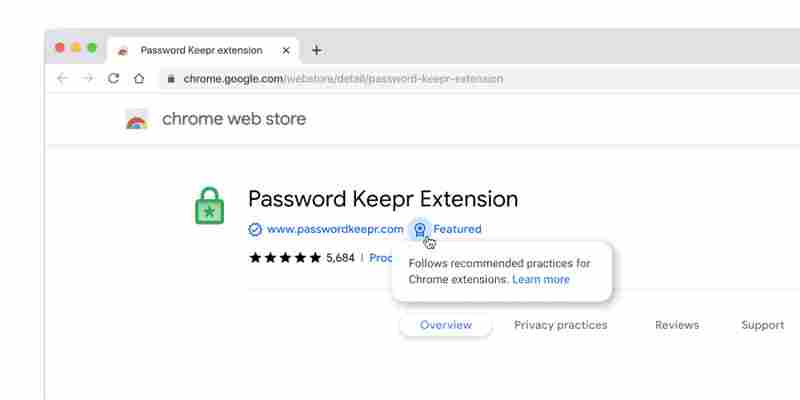Google Chrome is widely regarded as one of the best browsers around – but this popularity often comes with some risk, as criminals look to target its huge user base.
In its latest update , the company is attempting to help users decipher which Google Chrome extensions are legitimate and which ones to avoid through new Chrome Web Store badges.
Google says there will be two types of badges: Featured, given to extensions that "follow our technical best practices and meet a high standard of user experience and design"; and Established Publisher, for those "who have verified their identity and demonstrated compliance with the developer program policies."

The goal is to give users an easier way to see whether an extension is really what it says it is without having to look through the reviews or search the web - hopefully helping users avoid malware and other security threats.
Google says the overall process for awarding the badges will be manual – hopefully helping cut down on bad actors gaming the system – and will be based on whether the extension complies with the latest APIs, offers an "enjoyable and intuitive experience", and other factors.
Extensions can be dangerous
It feels like every month (or maybe every two) we get a new story about a bad Chrome extension that abused its privileges to infect a person's computer or some other dastardly scheme.
A recent example was The Great Suspender, a popular extension that forced excess tabs to sleep to save resources, that was delisted by Google (and even uninstalled for users) for containing malware.
The openness of the Chrome Web Store means that pretty much anyone can get in and given the sheer popularity of Chrome, which has a 90%-plus market share , bad extensions are a serious opsec risk.
Massive Google Workspace update dials up the fight for hybrid working supremacy
Google has lifted the lid on a series of updates for its Workspace suite of productivity and collaboration software designed to cater to the needs of the hybrid working era.
Some of the upgrades are small, like the ability to react with emojis during video meetings , but others could have a major impact on the way in which workers collaborate on shared documents, presentations and spreadsheets .
Most significantly, Google says it will integrate Meet directly into Docs , Sheets and Slides in the coming weeks, which will allow Google Workspace users to quickly spin up a meeting when collaborating on a project. Unlike traditional screen-sharing, video feeds will be housed within a dedicated sidebar, positioned alongside the content the team is working on.
Google Workspace for hybrid working
Since the birth of G Suite in 2006, Google has competed directly with Microsoft in the office software space, going up against the famous Microsoft 365 suite, which houses the likes of Word , PowerPoint , Excel etc.
One of the defining features of Microsoft’s offering is tight integration between apps and services, extending all the way out to the Windows operating system on which most business computers run. And although Google stole the march on Microsoft when it came to the cloud -based model, individual G Suite apps have historically felt much more isolated.
When Google rebranded its productivity suite as Workspace in 2020, however, the company announced it would make a concerted effort to create a more “deeply integrated user experience”, by improving the level of interoperability between its various productivity apps.

The latest round of Google Workspace updates take strides towards achieving this goal, capitalizing on the full breadth of the suite to create functionality that should help workers improve their productivity in a hybrid working setting.
In addition to new synergies with Workspace office software, Google Meet will also receive a new picture-in-picture mode next month, which will allow Chrome users to bring up a floating meeting window that sits on top of other browser tabs.
And from a security perspective, Google is set to launch client-side encryption for Meet calls in May, with optional end-to-end encryption to follow by the end of the year, bringing the service on-par with Teams and Zoom .
To support asynchronous collaboration, meanwhile, Google is preparing a number of updates for its Spaces messaging platform. Most notably, the company is improving the search functionality to help users surface the most relevant conversations and rolling out Slack-like inline message threading, which is apparently a highly requested upgrade.

“One of the hopeful signs of a return to normalcy is seeing many of our customers make plans to come back into their offices. And they’re asking for strategies that will make hybrid work a more equitable and productive experience for everyone. We’re also beginning our own transition to hybrid work in early April,” said Google.
“As we gear up for that, it feels like a time of optimism for new ways of working together and the potential for hybrid models to become the sustainable norm. When designed well, a hybrid model gives employees the flexibility to deliver their best from anywhere, while bringing them together thoughtfully for the power of in-person collaboration.”
Cross-country skiing live stream: how to watch Beijing 2022 online for free
With 12 cross-country skiing events at Beijing 2022, including the Men’s and Women’s Sprint Classic, Sprint Free, Relay, Classic, Skiathlon, and Mass Start Free, there's plenty of gruelling action on offer. If you want to spectate (from the warmth of your home, obviously), here's how to watch every cross-country skiing live stream wherever you are.
With races ranging from 7.5 to 50 km long, cross-country skiing is a sport that pushes its athletes to the limits of their physical endurance, and the Zhangjiakou National Cross-Country Skiing Center is where we'll see these brave souls take part in the cross-country skiing events at Beijing 2022.
Keep an eye on the reigning women’s overall world champion Jessie Diggins, from the United States, the first U.S. woman to win an overall World Cup gold in cross-country skiing. That said, Norway could be the team to watch at this year’s Winter Olympics, as they field several top competitors, including the current men’s World Cup leader, Johannes Hoesflot Klaebo, and 14-time women’s world champion, Therese Johaug.
The Winter Olympics cross-country skiing takes place from February 5-20, and below you'll find all the information on how to watch a cross-country skiing live stream from the Beijing 2022 Winter Olympics, wherever you are in the world.
Watch a cross-country skiing live stream with a VPN
There are so many events going on at the Winter Olympics that not every country's TV and streaming coverage shows every discipline. If you can't get the cross-country skiing where you are, then you can use a VPN to tune into a live stream from another country – something you might need to do if travelling abroad.
By downloading and installing a VPN , you can effectively trick your computer into thinking that it's back at home in the same country as the streaming service that you're trying to access. That way you can enjoy your home coverage without having to find an illegal stream - assuming you comply with the broadcaster's fine print, of course.
Use a VPN to watch the cross-country skiing from anywhere
How to use a VPN
Using a VPN is as easy as one-two-three...
1. Download and install a VPN - as we say, our top choice is ExpressVPN
2. Connect to the appropriate server location - open the VPN app, hit 'choose location', eg: select 'US' for Peacock, or 'UK' for BBC, 'Australia' for 7Plus or 'Canada' for CBC.
3. Go to the broadcaster's live stream - so that might be 7Plus , CBC , BBC iPlayer or Peacock TV .

Cross-country skiing live stream: how to watch Beijing 2022 online in the UK

USA: Cross-country skiing live stream: watch every Beijing 2022 event on Peacock

Cross-country skiing live stream: how to watch Beijing 2022 online in Australia
Cross-country skiing live stream: how to watch Beijing 2022 online in Canada
Watch the cross-country skiing: live stream Beijing 2022 in New Zealand
Beijing 2022 cross-country skiing: dates and times
February 5: Women’s 7.5km+7.5km Skiathlon, Medals: 7:45am GMT, 2:45am ET, (Feb 4) 11:45pm PT
February 6: Men’s 15km+15km Skiathlon, Medals: 7:00am GMT, 2:00am ET, (Feb 5) 11:00pm PT
Beijing 2022 Winter Olympics schedule and events